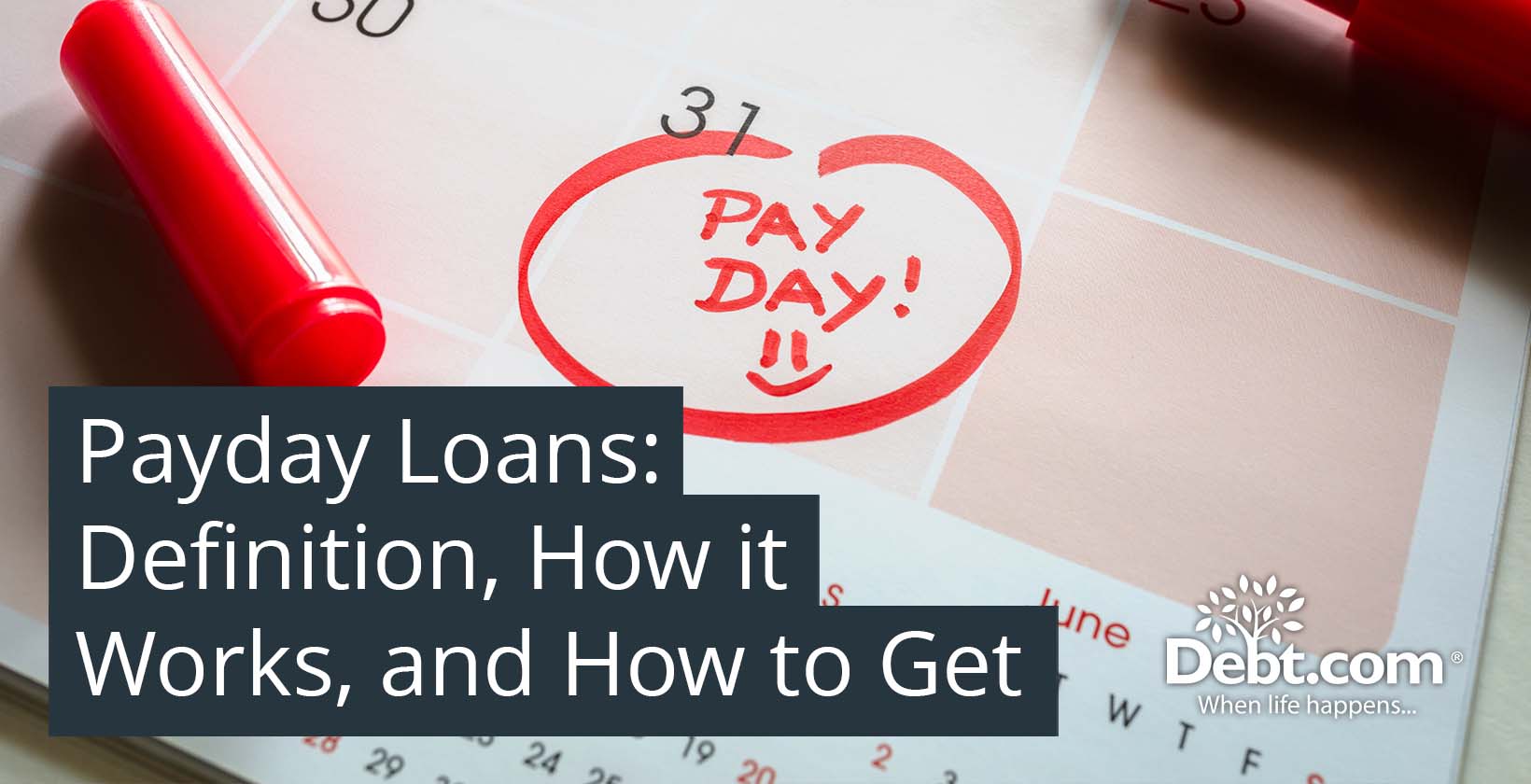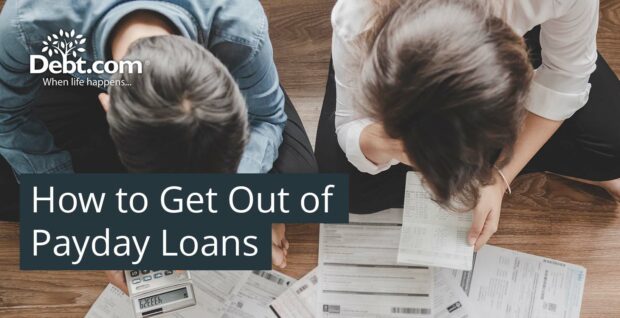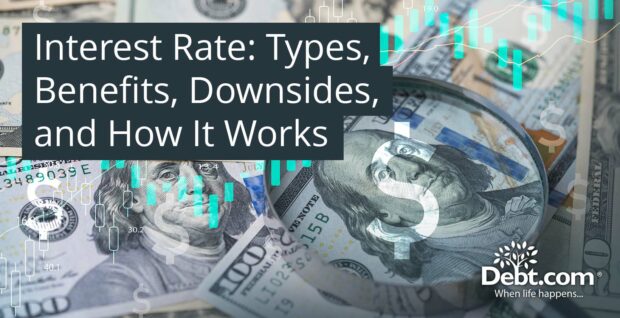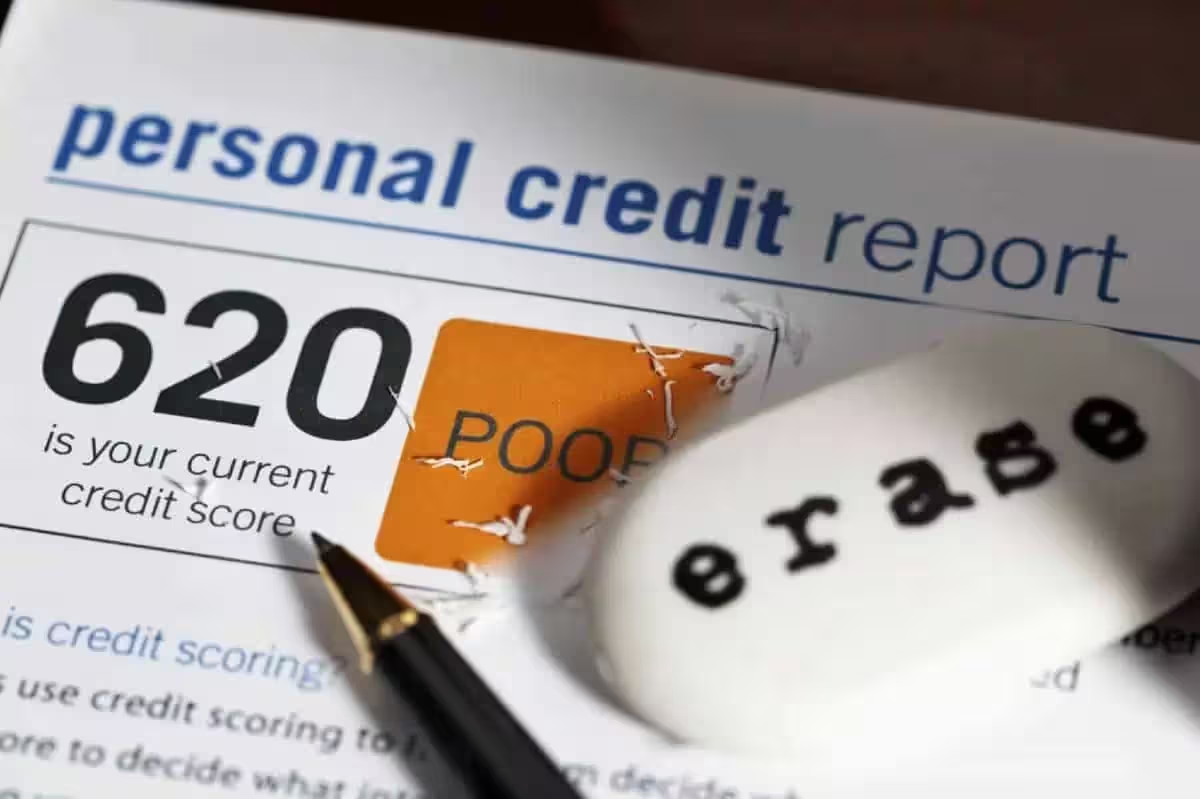
Desperate for cash? A sudden car repair, an unexpected bill, or just plain running short before payday can leave you feeling like you’re between a rock and a hard place. You might be tempted to take advantage of a quick fix: payday loans. They promise fast cash with minimal hassle, and can seem like a lifeline in times of need. But just like anything, if something seems too good to be true, it usually is. Payday loans come with a lot of strings attached, so before you take one out, it’s important to understand exactly what a payday loan is, how it works, and what the downsides are.
Table of Contents
What is a Payday Loan?
A payday loan is a short-term, high-cost loan, typically for up to $500, intended to be repaid with the borrower’s next paycheck. Payday loans are accessible with minimal requirements, often requiring identification, proof of income, and a bank account. They cater mainly to borrowers who struggle to obtain traditional loans due to poor credit histories because they don’t require a credit check.
These loans are often criticized for their exorbitant interest rates and fees, prompting caution among financial experts. These loans trap borrowers in a cycle of debt due to the high costs associated with borrowing.
How do Payday Loans Work?
To qualify, you’ll generally need to provide proof of income, such as recent pay stubs, and a bank account. Lenders use this information to assess your repayment ability. While credit checks are often not required, the high fees and interest rates compensate for this. The lender will then provide a small loan plus a fee, with repayment typically due within 30 days or by your next payday. Repayment is usually handled via a postdated check or electronic withdrawal from your bank account on the due date. Payday lenders operate both online and through physical storefronts.
Before taking out a payday loan, it’s important to compare fees and interest rates from different lenders and thoroughly review all loan terms and conditions, including the due date and the total cost.
When are Payday Loans usually Used?
While generally not recommended, payday loans are sometimes used for a few reasons. Many people struggle to cover even small emergency expenses; Federal Reserve data says that 13% of adults couldn’t handle a $400 unexpected bill. So, when emergencies like car repairs or medical bills arise, the quick cash offered by payday loans can be appealing.Others might use them for unexpected expenses or when they’re short on funds for essential bills like rent and utilities. For those without bank accounts or other borrowing options, perhaps due to bad credit, payday loans might seem like one of the few available choices. Finally, some people resort to payday loans as a last option after exhausting all other possibilities, such as borrowing from family or using credit cards.
Are Payday Loans Secured or Unsecured?
Payday loans are unsecured. This means you don’t have to offer anything valuable, like your car or house, as a guarantee for the loan. Instead as a guarantee for the loan, payday lenders usually make you give them a check dated for your next payday, or let them take money directly from your bank account. This is how they make sure they get paid back.
What is the Difference of Payday Loans to Personal Loans?
Payday loans and personal loans are not the same thing. They differ significantly in size, repayment terms, cost, and accessibility. Payday loans are small (typically for $500 or less), short-term loans that carry extremely high interest rates, but are relatively easy to obtain, even with bad credit.
Personal loans, on the other hand, are larger, usually ranging from $1,000 to $50,000, and offer longer repayment terms, typically one to seven years. They come with much lower annual percentage rates (APRs), usually between 6% and 36%, making them a more affordable option. However, personal loans have stricter eligibility requirements, including a good credit score, proof of steady income, and a manageable debt-to-income ratio. It also generally takes longer to receive the funding for a personal loan (anywhere from a few days to a week or more).
Another big difference is the repayment structure. Payday loans often require a lump-sum payment, while personal loans offer fixed monthly payments, providing more financial stability.
Missing payments on payday loans and personal loans both have negative consequences, but the impact can be different. If you miss a payday loan payment, you’ll get hit with large fees and high interest rates, quickly making the loan much more expensive. Payday lenders are also known for their aggressive collection tactics, which may include frequent calls, letters, and even legal action.
On the other hand, missing a payment on a personal loan primarily affects your credit score. While you’ll still incur late fees and potentially some added interest, these are typically less severe than those associated with payday loans. Personal loan lenders are also generally more willing to work with borrowers to create manageable repayment plans, especially if you communicate proactively about your situation. They are less likely to resort to immediate legal action, though continued missed payments will eventually lead to delinquency and potentially default, both of which severely damage your credit. It’s important to remember that both types of loans carry risks, but the immediate financial and collection pressures are usually much higher with payday loans.
Are Payday Loans Legal?
Whether payday loans are legal depends on where you live. Some states have banned them or made them so restricted that they’re basically unavailable. Other states allow them, but they might have rules about how much you can borrow or how long you have to pay it back. There are some other laws in place restricting them like the Military Lending Act, which caps APRs of payday loans at 36% for active-duty military personnel and their dependents. The measure aims to stop predatory loan activities from jeopardizing military personnel’s financial stability.
The laws about payday loans are always changing, and it can be tricky to keep up with them, especially with online lenders. Just because a website offers payday loans doesn’t mean they’re legal in your state. If you’re thinking about getting a payday loan, it’s important to check the rules in your state.
What are the Advantages of Payday Loans?
Payday loans offer a few potential advantages, primarily related to their ease of access:
- Easy access: Payday loans are generally much easier to get than traditional bank loans. They often have fewer requirements, typically just proof of income and a bank account, making them accessible even to those with bad or no credit.
- Speed: The application and approval process for payday loans is often very fast. You might get the money the same day you apply, sometimes even within a few hours. This speed can be helpful in genuine emergencies.
- No credit check (often): Many payday lenders don’t do a traditional credit check. This can be a plus if you have poor credit and can’t qualify for other types of loans. However, this doesn’t mean no checks are done; lenders may verify income or other information.
- Convenience: Applying for a payday loan is usually quick and easy, often done online or at a storefront. The process typically involves less paperwork and a faster turnaround than traditional loans.
What are the Disadvantages of Payday Loans?
Payday loans come with significant drawbacks that often outweigh their limited advantages:
- Extremely high interest rates: Payday loans are notorious for their exorbitant interest rates, often reaching 400% to 780% APR or even higher. This makes them incredibly expensive, especially if you don’t repay the loan immediately.
- Short repayment terms: You typically have to repay a payday loan by your next payday, usually within two weeks to a month. This short time frame can make it difficult to come up with the full amount to repay.
- Debt cycle trap: The combination of high interest and short terms frequently traps borrowers in a cycle of constantly renewing or “rolling over” their loans. Each rollover adds more fees and interest, making it increasingly difficult to escape the debt.
- Hidden fees and penalties: Beyond the high interest, payday loans often come with extra fees for late payments, rollovers, or insufficient funds. These fees can quickly add up, making the loan even more expensive than it initially appears.
- Negative impact on finances: The high costs and short repayment terms of payday loans can put a serious strain on your finances. They can lead to overdraft fees, bounced checks, and difficulty covering essential expenses.
- No credit building: Unlike many other types of loans, payday loans generally don’t help you build or improve your credit score. Many payday lenders don’t report your payment history to the credit bureaus, so even if you repay the loan on time, it won’t have a positive impact on your credit.
- Predatory lending practices: Some payday lenders engage in predatory tactics, such as hiding important information about the loan terms or pressuring borrowers to take out multiple loans. These practices can leave borrowers in a very vulnerable and unstable situation.
- Limited regulation in some areas: While some states have strict laws regarding payday lending, others have little to no oversight. This lack of regulation can make borrowers more susceptible to predatory lending practices and exploitation.
- Might not be able to be included in a debt management plan: If you are trying to get out of debt with a debt management plan (DMP), payday lenders may refuse to participate. This can leave your payday loan outside the plan, making it harder to manage and potentially hindering your overall debt reduction efforts.
How much do Payday Loans Cost?
Payday loan fees typically range from $10 to $30 for every $100 you borrow. For example, on a $375 loan, that could mean a finance charge of $56.25 to $75. You then have to repay the full $375 plus that charge, usually within two weeks. If you can’t repay it on time, you might be offered a “rollover,” which extends the loan but adds even more fees and interest. This can quickly escalate; that same $375 loan could balloon to nearly $500 in just one month. These high costs and short repayment periods can trap borrowers in a cycle of debt, making it very difficult to repay the original loan and leading to long-term financial hardship.
What is the Average Interest Rate for Payday Loans?
Payday loan fees typically range from $10 to $30 for every $100 you borrow. For example, on a $375 loan, that could mean a finance charge of $56.25 to $75. You then have to repay the full $375 plus that charge, usually within two weeks. If you can’t repay it on time, you might be offered a “rollover,” which extends the loan but adds even more fees and interest. This can quickly escalate; that same $375 loan could balloon to nearly $500 in just one month. These high costs and short repayment periods can trap borrowers in a cycle of debt, making it very difficult to repay the original loan and leading to long-term financial hardship.
Is Interest for Payday Loans Fixed Rate?
No, payday loans don’t use fixed interest rates in the way traditional loans do. Instead, they charge a fixed finance fee or charge, typically ranging from 15% to 30% of the amount borrowed. While this fee might seem small, it translates to an extremely high Annual Percentage Rate (APR) because the loan term is so short, usually just a couple of weeks. For example, a $15 fee on a $100 two-week loan equates to an APR of roughly 391%. These APRs can climb even higher, sometimes exceeding 650%, far surpassing the interest rates of traditional loans. So, while the fee itself is fixed, the effective interest rate you’re paying is incredibly high due to the short repayment window.
How much can You Borrow with a Payday Loan?
States and their maximum loan amounts you can borrow with a payday loan are listed below.
- $300 Loan Amount: California, Montana
- $350 Loan Amount: Minnesota, Louisiana
- $425 Loan Amount: Tennessee
- $500 Loan Amount: Alabama, Alaska, Colorado, Delaware, Florida, Idaho, Iowa, Kansas, Kentucky, Michigan, Mississippi, Missouri, Nebraska, North Dakota, Ohio, Oklahoma, Oregon, Rhode Island, South Dakota, Texas, Virginia
- $550 Loan Amount: Indiana, South Carolina
- $600 Loan Amount: Hawaii, Michigan
- $700 Loan Amount: Washington
- $1000 Loan Amount: Idaho
Maximum Amount Borrowed and APR for Payday Loans
State by State Payday Loan Data
| State | Max Loan Amount | Cap APR% | Max Loan Term | Charges | |
|---|---|---|---|---|---|
| Alabama | $500 | 456% | 31 days | Max fee is 17.5% | |
| Alaska | $500 | 435% | 14 days | 15% of the amount advanced | |
| Arizona | Prohibited | Prohibited | Prohibited | Prohibited | |
| Arkansas | Prohibited | Prohibited | Prohibited | Prohibited | |
| California | $300 | 460% | 31 days | 15% of the amount advanced | |
| Colorado | $500 | 36% | 6 months | Not Specified | |
| Connecticut | Not Specified | Not Specified | Not Specified | Not Specified | |
| Delaware | $1,000 | Not Specified | Not Specified | Not Specified | |
| Florida | $500 | 304% | 31 days | 10% charge; One loan limit at a time; No roll-over allowed | |
| Georgia | Prohibited | Prohibited | Prohibited | Prohibited | |
| Hawaii | Prohibited | 460% | 32 days | 15% of the mount advances; One loan limit at a time; No roll-over allowed | |
| Idaho | $1,000 | 652% | Not Specified | A loan cannot exceed 25% of borrower’s gross monthly income | |
| $1,000 | 404% | Up to 120 days | One loan limit at a time; Finance charge 15.5% per $100 | |
| Indiana | $550 or 20% of gross income | 382% | Not Specified | 10%, 13% or 15% finance charge depending on amount advanced; No roll-over allowed | |
| Iowa | $500 | 337% | 31 days | 15% finance charge on the loan up to $100 and only 10% on subsequent $100 | |
| Kansas | $500 | 391% | 30 days | 15% of the amount advanced; No roll-over allowed; 2 loans at a time | |
| Kentucky | $500 | 460% | 30 days | 15% finance charge of $100; No roll-over allowed | |
| Louisiana | $350 | 391% | 30 days | 16.75% of the amount advanced | |
| Maine | $2,000 | 217% | Not Specified | Small loan rate cap | |
| Maryland | Not Specified | Not Specified | Not Specified | Not Specified | |
| Massachusetts | Not Specified | Not Specified | Not Specified | Not Specified | |
| Michigan | $600 | 369% | 30 days | Two loans at a time allowed; 15%-11% finance charge | |
| Minnesota | $350 | 200% | 30 days | Finance charge varies depending on amount of a loan | |
| Mississippi | $500 | 521% | 30 days | Finance charge 20%-21.95% for $100; No roll-over allowed | |
| Missouri | $500 | 443% | 31 days | Finance charges should not exceed 75% of initial loan amount;6 roll-overs allowed | |
| Montana | $300 | 36% | 31 days | 1.39% finance charge for $100 given for 2 weeks | |
| Nebraska | $500 | 460% | 34 days | 15% of the amount advanced; No roll-over allowed | |
| Nevada | Percent of Income | No Limit | 35 days | Real APR 625%;No restriction to a number of loans | |
| New Hampshire | $500 | Not Specified | Not Specified | Not Specified | |
| New Jersey | Not Specified | Not Specified | Not Specified | Not Specified | |
| New Mexico | Prohibited | Prohibited | Prohibited | Prohibited | |
| New York | Not Specified | Not Specified | Not Specified | Not Specified | |
| North Carolina | Prohibited | Prohibited | Prohibited | Prohibited | |
| North Dakota | $500 | 487% | 60 days | 20% of the amount advanced | |
| Ohio | $1,000 | 28% | 1 year | One loan is allowed at a time; No roll-over allowed | |
| Oklahoma | $500 | 395% | 45 days | 10%-15% finance charge | |
| Oregon | $50,000 | 154% | 60 days | Finance charges are capped at 36% | |
| Pennsylvania | Not Specified | Not Specified | Not Specified | Not Specified | |
| Rhode Island | $500 | 261% | Not Specified | 10% on the amount advanced | |
| South Carolina | $550 | 391% | 31 days | 10% on the amount advanced | |
| South Dakota | $500 | 36% | Not Specified | 1.39% finance charge for $100 given for 2 weeks; 4 roll-overs allowed | |
| Tennessee | $500 | 460% | 31 days | 15% of the amount of the check | |
| Texas | Not Specified | 662% | Not Fixed | Finance charge varies depending on amount of a loan; No roll-over allowed | |
| Utah | No Limit | 658% | 70 days | No limits on finance charges | |
| Vermont | Not Specified | Not Specified | Not Specified | Not Specified | |
| Virginia | $500 | 36% | 30 days | APR is capped at 36%; 5% verification fee; 20% loan fee | |
| Washington | $700 or Percent of Income | 391% | 45 days | 10%-15% finance charges; no roll-over | |
| West Virginia | Not Specified | Not Specified | Not Specified | Not Specified | |
| Wisconsin | $1,500 or Percent of Income | 547% | 90 days | 2.75% monthly finance charge; 2 renewals allowed | |
| Wyoming | Not Specified | 261% | 1 month | 20%-30% finance charges per month |
Where can You Get Payday Loans?
There are several types of institutions and services where you can get payday loans
- In-store payday lenders: Many payday loan companies operate storefronts where borrowers apply for and receive funds in person. These lenders offer additional services like check cashing.
- Online payday lenders: Numerous payday loan companies operate online, allowing borrowers to complete the application process via their websites. Online payday lenders often provide convenient access to funds without requiring a visit to a physical location.
- Check-cashing stores: Some check-cashing stores serve as payday loan companies, offering payday loans as a service. These stores cater to individuals who need immediate access to cash and provide other financial services.
- Banks and credit unions: Some traditional financial institutions, including banks and credit unions, act as payday loan companies by offering payday loans or short-term lending options. These loans are available to existing customers and often come with more favorable terms than typical payday lenders.
- Pawn shops: Pawn shops function as payday loan companies, offering payday loans secured by valuable items. These loans involve leaving an item of value as collateral and providing quick cash, though they risk losing it if the loan isn’t repaid.
- Online marketplaces: Online platforms and marketplaces connect borrowers with payday lenders willing to provide payday loans. These platforms simplify the application process but require scrutiny to ensure legitimacy and fair terms.
- Employer-based programs: Some employers act as payday loan companies and offer employees payday advance programs or short-term loans. These programs allow employees to access a portion of their earned wages before the scheduled payday, often with lower fees than traditional payday loans.
- Mobile apps: Mobile apps are increasingly emerging as platforms for payday loan companies. These apps allow borrowers to apply for loans, manage repayments, and access customer support directly from their smartphones, enhancing convenience.
How to Get a Payday Loan?
To get a payday loan, follow these steps:
- Browse lenders: Begin by browsing payday loan lenders, either online or locally, to explore options and understand the services offered.
- Provide basic requirements: Present proof of identity, employment, and income to qualify for the loan. Payday lenders typically do not require a credit check but verify the basic information.
- Complete the application: Fill out the application form online, in person at a physical location, or through fax or phone. Ensure a valid checking account, although some lenders accept a savings account.
- Sign the loan agreement: Sign electronically for online applications or in person after the lender discloses the terms and conditions as per federal regulations.
- Wait for approval: This usually occurs within a few hours. The approval rate for borrowers with less-than-perfect credit is generally higher than for borrowers with perfect credit.
- Receive cash once approved: The loan amount is electronically deposited into the bank account, typically within 24 hours.
What are the requirements for payday loans?
There are a few requirements for payday loans:
- Age requirement: Payday lenders typically require borrowers to be 18 years or older to enter a loan agreement.
- Valid government-issued ID: A valid government-issued ID, such as a passport or driver’s license, proves the identity.
- Proof of stable income source: Provide evidence of a stable income source, including employment, disability benefits, retirement income, or income from self-employment. The stipulation guarantees that the borrower possesses the resources to reimburse the loan.
- Possess an active checking account: Most payday lenders demand that applicants have an open, active checking account that has been active for a minimum of one month. The loan funds and the loan repayment are deposited into the account.
- Personal bank account: A personal bank account, which includes a savings account, is accepted instead of a checking account, depending on state laws and lender standards.
- Provide a working email address: An email address is usually needed for communication purposes, such as issuing loan agreements, notifications, and updates.
- Be reachable by phone: Lenders must call the borrower to confirm the application’s specifics and validate the identity and employment data.
- Not be a dependent of a military member or a member of the armed forces: The Military Lending Act (MLA) protects active-duty military personnel and their dependents, limiting the duration and interest rates of loans given to them. They are typically not eligible for payday loans.
- Not be in a bankruptcy case: Bankruptcy proceedings prevent borrowers from obtaining a payday loan.
Do Payday Lenders Check Your Credit?
Payday lenders typically don’t conduct a traditional credit check (or hard inquiry). However, this doesn’t mean they don’t assess your creditworthiness at all.
Instead of a hard credit check, payday lenders may use alternative methods to verify your information and assess your ability to repay. These can include:
- Verifying your income: They will almost certainly require proof of income, such as pay stubs or bank statements, to ensure you have a regular source of income.
- Checking your bank account: They often require access to your bank account, sometimes even requiring a post-dated check or authorization for electronic withdrawals, to secure repayment. They might also check for overdrafts or other signs of financial instability.
- Using alternative credit reporting agencies: Some payday lenders may use smaller, specialized credit reporting agencies that focus on short-term or subprime lending. These agencies might track things like previous payday loan usage.
What Happens when You Default on a Payday Loan?
When you default on a payday loan, you can face serious consequences. Contact the lender if you need help making payments to work out a plan before going into default. Taking preventative action reduces the long-term harm to financial security. If you do default, here are some of the things that can happen:
Additional fees and interest
When borrowers default, they are immediately charged additional fees and interest. Nonsufficient funds (NSF) fees are just one example of the extra costs and penalties for nonpayment that apply, depending on the lender and borrower’s location. These fees quickly add up, increasing the total amount of debt borrowers owe.
Debt collection activities
Borrowers are likely to be the target of aggressive debt collection activities. The lender makes initial efforts to recover the loan for around 60 days. A third-party collection agency is tasked with collecting the debt if the borrower is still unable to pay. These organizations put much more effort into recovering money, frequently involving persistent correspondence and phone calls.
Credit score impact
A payday loan sent to collections negatively affects the credit score if borrowers miss payments and will remain on the credit report for seven years. This makes it more difficult to get approved for loans, credit cards, or other financing in the future, as lenders see borrowers as a higher risk.
Legal action
Collection agencies occasionally file lawsuits, even if the loan amount is minor. It leads to wage garnishment or property liens, further damaging the finances.
Some lenders threaten arrest or imprisonment for nonpayment. These threats are illegal, so contact the state attorney general’s office immediately if you receive one.
Why are Payday Loans considered Bad?
Payday loans are widely considered a bad financial choice for several key reasons. Their extremely high interest rates and fees create a significant financial burden for borrowers. These costs, often expressed as an Annual Percentage Rate (APR) averaging around 400%, make it incredibly difficult to repay the loan, often resulting in borrowers needing to take out more payday loans just to cover the original debt. This creates a dangerous cycle of debt that’s hard to escape.
Beyond the high costs, payday loans are often criticized for predatory lending practices. Because they target individuals with limited financial options and often don’t require credit checks, they can trap vulnerable borrowers in unsustainable debt. While the quick cash and lack of a credit check might seem appealing, they ultimately mask the high cost of borrowing and the potential for long-term financial hardship.
How to Get Out of a Payday Loan?
Payday loans are designed to be difficult to escape, so getting out of a payday loan requires a proactive approach. Here’s a breakdown of strategies that may help:
Refinance with a less expensive loan
Explore options like small personal loans from online lenders, community banks, or credit unions. These often have significantly lower interest rates than payday loans. Consolidating multiple payday loans into a single personal loan can also simplify repayment. If your credit is an issue, consider asking a creditworthy friend or family member to co-sign, but be aware of the risks this poses for them.
Pay with savings
If possible, using savings to pay off the payday loan entirely is the best way to avoid the accumulating interest and fees. Afterward, focus on rebuilding your savings to create a financial safety net and prevent future reliance on high-cost loans.
Negotiate an extended repayment plan
Contact your payday lender directly and ask about extended repayment plans or hardship programs. Some lenders offer these options, which can provide more time to repay with potentially lower fees or interest rates than repeatedly rolling over the loan.
Increase income and cut expenses
Explore ways to earn extra money to pay off your debt, such as a second job or selling unwanted items. Simultaneously, review your budget and identify areas where you can cut unnecessary spending. Directing this extra cash toward your payday loan will accelerate your repayment and help you regain financial stability.
Consolidate
If you have multiple payday loans, consolidating them into a single loan can simplify repayment and potentially reduce your overall costs. This involves taking out a new loan, often a personal loan from a credit union, online lender, or even a debt consolidation company, and using the funds to pay off all your existing payday loans. The new loan will ideally have a lower interest rate and more manageable repayment terms than your combined payday loans. However, it’s crucial to compare the terms and fees of the consolidation loan carefully to ensure it truly saves you money and doesn’t create further financial strain. Be aware that some consolidation loans may also come with fees, so factor those into your decision.
Contact a credit counselor
Nonprofit credit counseling agencies can provide valuable assistance in escaping the payday loan cycle. Credit counselors can help you create a budget, manage your debt, and negotiate with lenders. They may also be able to offer debt management plans (DMPs), which can consolidate your debts and lower your interest rates. While they may not be able to directly eliminate your payday loan, a credit counselor can provide expert guidance and support to help you develop a personalized plan to pay it off and improve your overall financial health. They can also help you understand your rights and explore other debt relief options.
What are the alternatives to payday loans?
Payday loans are expensive and can trap you in a debt cycle. Thankfully, there are several alternatives you can explore:
Personal loans
Personal loans offer lower interest rates and a structured repayment plan. A lump sum is repaid in equal monthly installments over a set period.
Credit union payday alternative loans (PALs)
PALs provide short-term loans with much lower interest rates than traditional payday loans, with repayment terms ranging from one to six months.
Peer-to-peer (P2P) lending
P2P allows borrowers to obtain funds directly from individual investors online, often at lower interest rates than payday loans or credit cards, though they include origination fees.
Credit card cash advances
Cash advances provide quick access to cash but come with higher interest rates than regular credit card purchases. Consider total costs, including fees and interest.
Community assistance programs
These programs are run by nonprofits or local governments and offer financial aid, grants, subsidies, or low-interest loans, often with additional support services.
Employer-based salary advances
They allow employees to receive a portion of their future earnings in advance without interest or fees, though availability is limited.
Nonprofit credit counseling services
Credit counseling services help individuals manage debt through budgeting assistance, debt management plans, and negotiation with creditors to reduce interest rates and fees.
Borrowing from family or friends
This can be a good option if you have someone willing to lend you money. There are important things to consider before doing so, so that you don’t damage your relationships. Make sure to create a written agreement with clear repayment terms to avoid any misunderstandings.
Government assistance programs
Government debt relief programs exist, but they’re limited in the types of debt relief they offer. However, they may provide financial support to eligible individuals and families in need, such as unemployment benefits, welfare, and subsidies so they’re worth exploring.
Bad credit loans
Bad credit loans are designed for individuals with poor credit scores. They offer more manageable terms than payday loans but often have higher interest rates than traditional personal loans.












